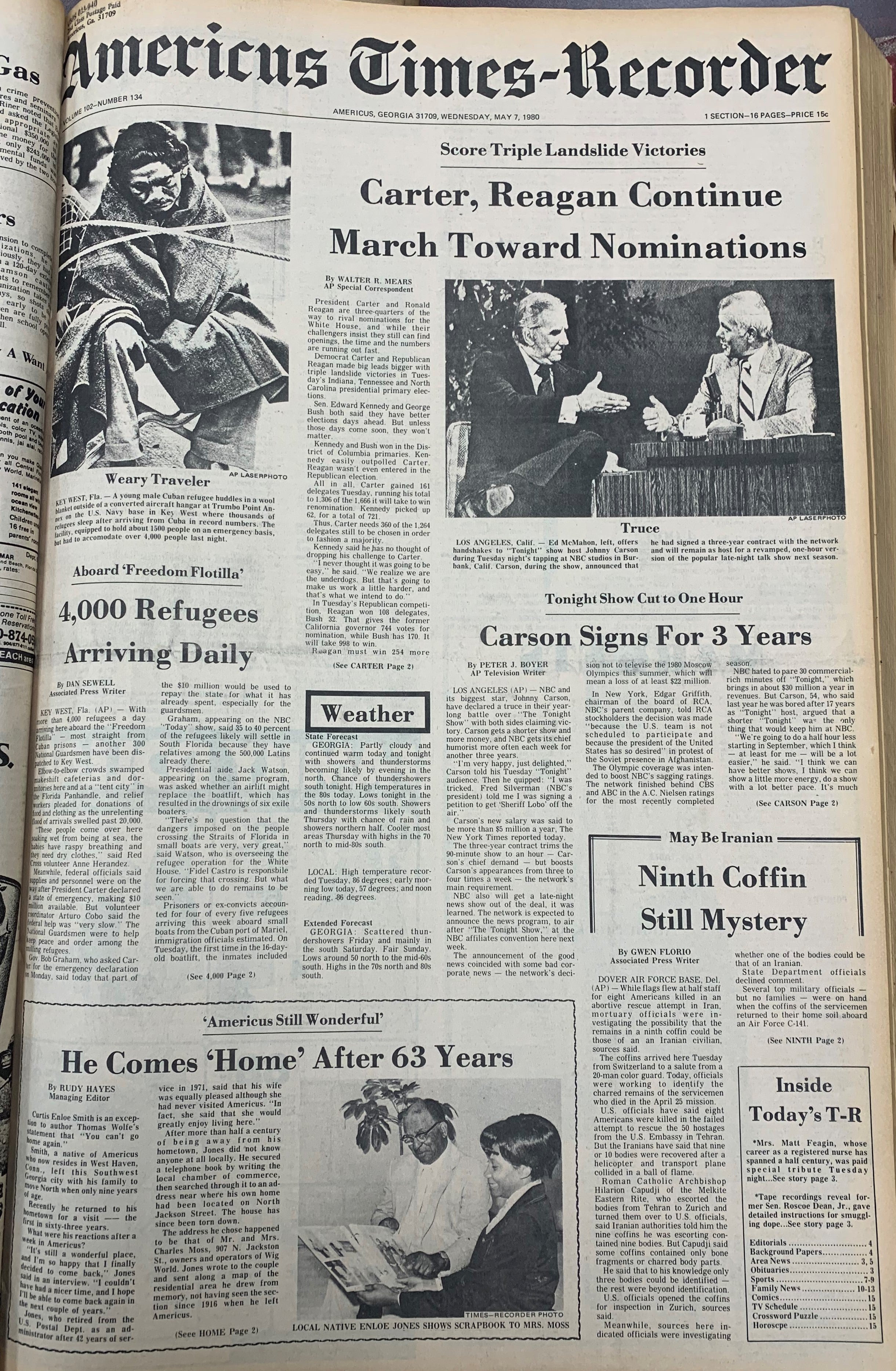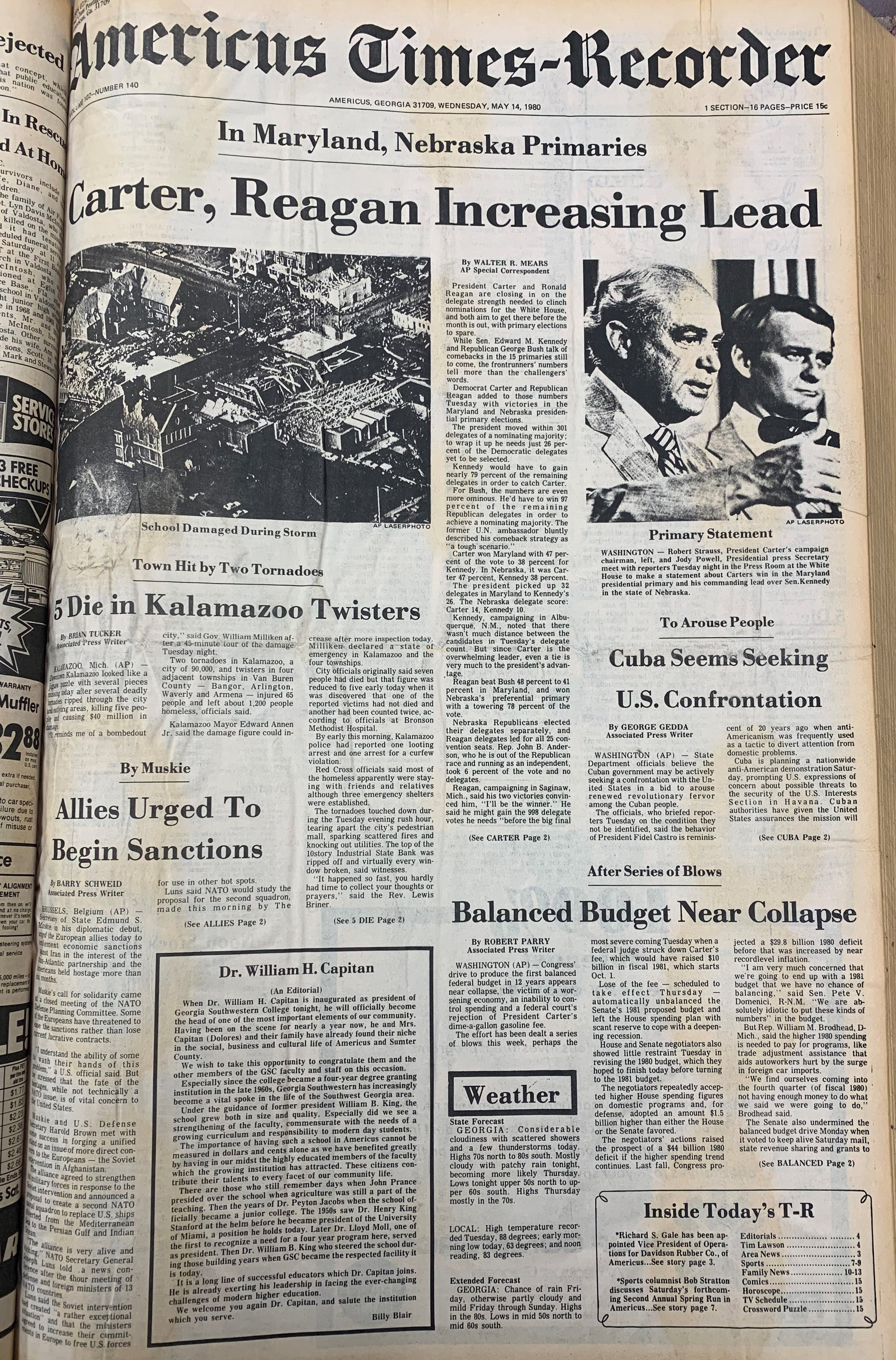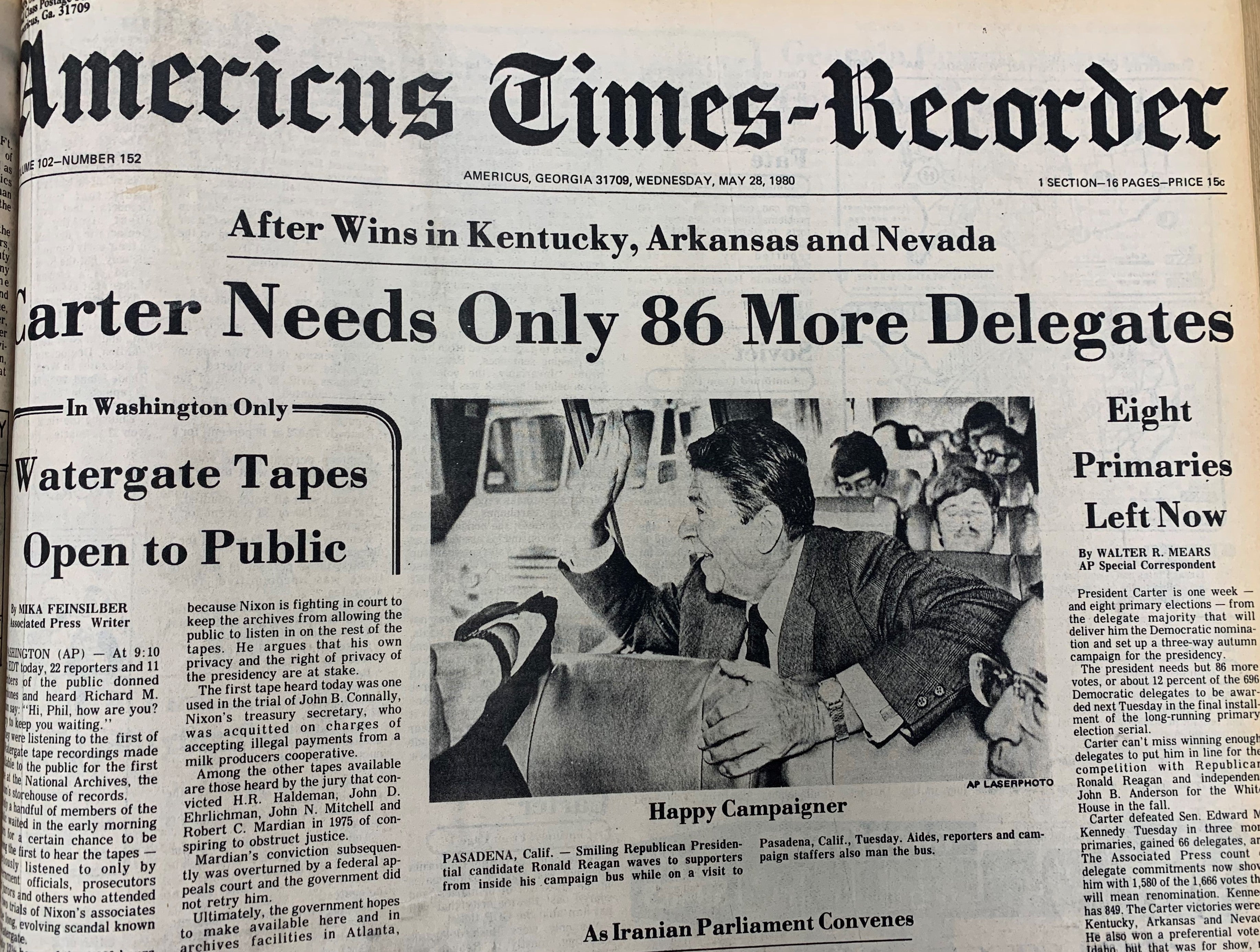Except D.C., Carter Victorious in May, “We Won All the Elections”
Published 11:44 am Wednesday, May 27, 2020
|
Getting your Trinity Audio player ready...
|
By: Jason Berggren
Note: D. Jason Berggren is an associate professor of political science at Georgia Southwestern State University. This is the sixth article in the Carter 1980 look-back series.
May – it was the last full month of the 1980 primary season. That year, it was the month with the most primaries.
February had one presidential primary, and March had eight. There were four in April. From May 3 to May 27, there were more than ten presidential contests. 1980 has a backloaded primary calendar.
From coast to coast, President Jimmy Carter won them all, save one. These victories all but earned him the title of presumptive Democratic nominee. He was on the cusp as the month came to an end.
According to the Gallup survey for May 2 – 5, Carter’s job approval rating was 43 percent. This was four points higher than where it was in mid-April. More importantly for the purposes of primary politics, his approval among self-identified Democrats rose from 48 to 55 percent.
The small yet discernible increase in job approval could have been the result of public support in the aftermath of the hostage rescue mission in Iran that failed on Apr. 24.
Carter delivered the eulogy for the eight servicemen who died on the morning of May 9 at Arlington National Cemetery.
Among Republicans in the Gallup survey, Carter’s job performance declined three points from 28 to 25 percent.
For his part, Senator Edward Kennedy was unable to build on his late April success in Pennsylvania and Michigan. In May, he was soundly beaten in contest after contest.
The first primary of the month was held May 3 in the largest southern state, Texas. The delegate count going in was Carter 1,109 and Kennedy 639. A delegate majority of 1,666 was required to win.
The May 3 primary was a big Carter win. In his White House diary, he wrote, “The Texas voting returns were very good for us. We got about 56 percent, Kennedy 22 percent…” It was his fifth primary win in the South. He had previously won the Alabama, Florida, Georgia, and Louisiana primaries
Carter prevailed all over the Lone Star State. In the most populous counties, he won Harris (Houston) by a margin slightly higher than he won statewide. He was even stronger in Dallas and Tarrant (Fort Worth) counties. He carried Travis (Austin), too. He won Bexar (San Antonio), but it was a single-digit win.
The Peanut Brigade, led by Mr. John Pope, once again came together to help their friend and neighbor, Jimmy Carter, with an out-of-state, grassroots, get-out-the-vote effort. Mrs. Betty Pope said that she wanted to inform Texas voters that “Georgia Loves Jimmy”.
Volunteers from Sumter County travelled to Texas and campaigned in several Gulf coast counties. According to an article published in the Americus Times-Recorder (May 8), they cultivated support in Brazoria, Chambers, Fort Bend, Galveston, Hardin, Jefferson, and Liberty counties. Mrs. Rosalynn Carter also campaigned in the state for her husband.
Carter’s one key weakness was in some Hispanic-majority counties along the southern border with Mexico. Kennedy won by large margins there.
Unlike most other primaries, Texas was a non-binding primary. Later that night, after the conclusion of the primary, Democratic voters were eligible to participate in caucuses to begin the process of choosing delegates for the national convention. It was expected that Carter would ultimately “pile up” delegates from the 152 available.
Voters were not permitted to caucus if they did not vote in the primary. According to an Associated Press article from May 3, “The primary was, in effect, the registration system to prove the Democratic credentials of caucus voters.”
For the Republicans, it was down to a two-person race. Ronald Reagan looked to defeat George H.W. Bush on his home turf. The former governor of California won Texas in 1976. He aimed to do it again and further solidify his advantage in the race for the party nomination.
Bush, a transplant from New England, was a former chair of the Harris County Republican Party in the early 1960s. He served two terms as a U.S. Representative from the state. He also ran for the U.S. Senate twice in 1964 and 1970, losing both bids.
To win the 1980 Republican nomination, a candidate needed to secure a delegate majority. That number was 998. At the time of the Texas vote, Reagan had 489 delegates and Bush had 112.
Reagan pulled out a narrow win, 51 – 47 percent. The frontrunner’s margin was expected to be larger.
Next up were the four May 6 primaries: Indiana, North Carolina, Tennessee, and the District of Columbia. President Carter and Governor Reagan were predicted to have a successful day. Colorado held precinct caucuses.
It was a successful election day for the Democratic and Republican frontrunners. Both won three of the four primaries. The May 7 headline for the Americus Times Recorder was, “Carter, Reagan Score Continue March Toward Nominations, Score Triple Landslide Victories”.
On the Democratic side, Carter outpolled Kennedy 68 – 32 percent in Indiana, 70 – 18 percent in North Carolina, and 75 – 18 in Tennessee. The President’s only setback was in D.C. There, he was defeated 62 – 37 percent.
Carter was delighted. He remarked in his diary entry for May 6: “We had excellent news from Tennessee, North Carolina, and Indiana – even D.C., and will gain about 165 delegates, which will put us over the 1,500 mark. Pat [Caddell] says the rescue mission [in Iran] seemed to have helped, rather than hurt.”
Reagan won the same states. He bested Bush 74 – 16 in Indiana, 68 – 22 in North Carolina, and, close to Carter’s margin, he won 74 – 18 in Tennessee.
At a White House gathering for civic and community leaders held on April 30, the President announced he was ending the so-called “Rose Garden” campaign strategy of not directly or actively campaigning for his party’s nomination. He adopted it back in November 1979 in response to the Iran hostage crisis. The December 1979 Soviet invasion of Afghanistan provided additional justification for this approach.
At this event, he was asked if there was “a chance that the people can see you, that you can be with them and you can get out in the countryside, you can get out in the States and be with us?” Carter answered, “Yes. As you know, it’s been a long time that I have stayed in the White House, under extraordinary circumstances that have demanded my presence…but times change.”
Going forward, Carter said he was ready for “a limited travel schedule, including some campaigning”. The decision to change course appeared on the front page of the Americus Times-Recorder for May 1. “Carter Plans Limited Campaign” was the headline.
On May 9, at Temple University in Philadelphia, Pennsylvania, Carter participated in his first town hall event since the fall. He did at least three fundraiser events in the month. He spoke at an African American church as part of a campaign swing. On May 29, he attended a campaign rally in Columbus, Ohio. He did not, however, commit to debating Senator Kennedy.
The Maryland and Nebraska presidential primaries took place on May 13. Carter and Reagan earned two more victories, moving them even closer to a delegate majority. Yet, the margin of Carter’s victories was smaller than the previous week.
For the Democrats, Carter won the Maryland primary 47 – 38 percent. He swept most of the state, including Baltimore City and Baltimore County. He lost the D.C. suburbs in Montgomery and Prince George’s counties.
In his diary entry for May 15, Carter lamented the loss of the Jewish vote in Maryland. “They seem to be supportive when I’m with them, but the Jews voted four to one against me in Maryland.” Earlier in the day, he had met with leaders from the United Jewish Appeal in the White House. “The purpose of the meeting,” according to the President’s daily diary schedule, “was to reaffirm the Administration’s support for Israel.”
In Nebraska, Carter bested Kennedy by an identical 47 – 38 percent margin. The size of the President’s share of the vote was slightly better in Douglas (Omaha) and Lancaster (Lincoln) counties.
Despite two more primary losses, Kennedy vowed to continue. He said, “I’m going to the convention. My name will be submitted for the nomination, we’ll call the roll.”
For his side, Reagan won the Republican voting in both states. In Maryland, he defeated Bush 48 – 41 percent in a competitive contest. Nebraska was a blowout, with Reagan winning 76 – 15 percent.
In terms of winning the nomination, California’s former governor declared, “I’ll be the winner.” For his part, Bush said, it would be a “tough scenario” for him to make a comeback.
Kennedy and Bush pressed for a debate with the respective frontrunners as their only real chance left to have a gamechanger. Bush had several debates with Reagan. They last debated Reagan in April.
Vice President Walter Mondale said Kennedy’s demand was just “desperation”. He rhetorically asked, “Why should the sitting president debate a losing candidate in in his own party?” For May 16, across the front page of the Americus Times-Recorder appeared, “Kennedy Move Seen As ‘Desperation Politics’, Mondale on Proposed Debate”.
Provided by the Associated Press, the updated Democratic delegate count heading into the second half of the month was Carter 1,364 and Kennedy 771. With only 302 delegates away from being the presumptive nominee, the President had 82 percent of the required amount.
Reagan had a wide lead in the Republican delegate count, 841 – 192 over Bush. He was 84 percent of the way to claiming his party’s nomination.
The next Democratic primary was on May 20 in Oregon. But the focus quickly turned from electoral politics to disaster response.
Two days before the primary, on Sunday, May 18, Mount St. Helens erupted. Located in Washington state, in the Cascades, the mountain came to life in a dramatic fury of ash and rock.
This incredible event made front-page news for the Americus Times-Recorder for several days beginning on May 19 and continuing through May 26. The May 19 headline read, “Volcanic Ash Falls on Three States, Five Killed, 21 Missing After Massive Eruption”. The next day on May 20, the headline was, “Awesome Volcanic Cloud Now Reaches Into South, Mount St. Helens Keeps Erupting”.
By a vote of 57 – 31 percent, Carter decisively won the Oregon primary. Reagan won Oregon as well, 54 -35.
In addition, the Republicans had a primary in Michigan. Bush won there handily, 58 – 32, a margin of victory was similar to Gerald Ford’s in 1976, when he beat Reagan 65 – 34. The win in Michigan likely improved Bush’s chances of earning a spot with Reagan on the national ticket.
Carter won another western state that week. He prevailed in the Utah caucuses.
After the May 20 primary, Carter visited the Oregon and Washington from May 21 – 22 to survey the volcanic damage. He viewed the devastation by helicopter. Cloud-cover blocked clear visibility of the volcano.
Carter said, “It was a horrible-looking sight.” In his White House diary, he described the devastation he witnessed as “much more extensive and serious” than he originally thought. This included layers of ash, homes decimated, trees leveled, and a loss of life.
Before he left the region to return to Washington, the President spoke to reporters in Portland, Oregon and Spokane, Washington and took some questions.
Saturday, May 24, area locals hosted “Jimmy Carter Day” in Preston, the county seat of Webster County. Mrs. Jerrie Walker chaired the event to show support for their President and neighbor from Sumter County and to celebrate his public service career. She spoke to the gathering in front of the county courthouse.
It was a fun-filled day of barbecue, music, dancing, clowns, Smokey the Bear, arts and crafts, and games for the children. The event started off with those who wanted to participate in a morning run.
There were displays of American flags, and, in honor of the American hostages in Iran, yellow ribbons were tied around trees.
The Americus Times-Recorder publicized it in an article by Rudy Hayes on May 19, “‘Jimmy Carter Day’ Nearing, Webster Co. Making Plans”, and then published photos of the occasion in its May 26 Memorial Day edition.
Also, that day, Monday, May 26, the Republican primary competition effectively came to an end when Bush announced his withdrawal from the race and his endorsement of Governor Reagan.
Before reporters in Houston, he said the time had come for the party to come together and be “united to save our country from Jimmy Carter’s weak, directionless and incompetent leadership.”
With Bush out, Bill Brock, the chair of the Republican National Committee, stated, “We have a Republican nominee.”
The Associated Press tally at that moment was Reagan far ahead with 919 and Bush 255. The results from the final May primaries pushed the him across the delegate threshold.
May 27 was the last of the month’s Democratic primaries. Voting occurred in four states: Arkansas and Kentucky in the east and Idaho and Nevada in the west. It was a clean sweep for Carter. “We won all the elections,” he wrote in his diary.
Carter first took Kentucky that night, 67 – 23 percent. Then, he won in Arkansas, 60 – 18 percent. Out west, he succeeded in Idaho, 62 – 22 percent. The primary, though, was a non-binding exercise.
In Nevada, the victory was a narrow one. Only 38 percent selected the President. Kennedy obtained 29 percent of the vote. The real surprise was “none of these candidates”. This option garnered the remaining third of the votes cast.
The delegate figure reported May 28 had Carter at 1,580. The Americus Times-Recorder captured the remaining task ahead for the President: “Carter Needs Only 86 More Delegates, After Wins in Kentucky, Arkansas and Nevada”. Inching closer to a delegate majority, he was 95 percent of the way there.
The Massachusetts Senator trailed far behind with 849 delegates.
There was one day of contests left in 1980 – June 3. It would be the single biggest day. Eight states held presidential primaries, including California. Kennedy called the final primary day as “the real Super Bowl of the Democratic primaries”.
The President did not need to win them all. He only needed to have some success to avoid a major embarrassment on the final day. Still, no matter how he performed, Carter would become the presumptive nominee. With the proportional rules of the party, he was sure to win his share and that would be enough to put him over the top.






